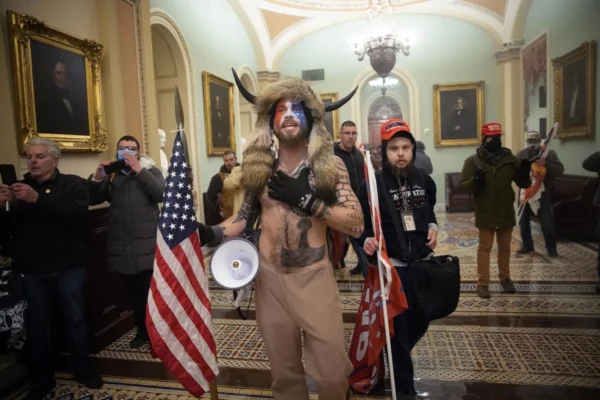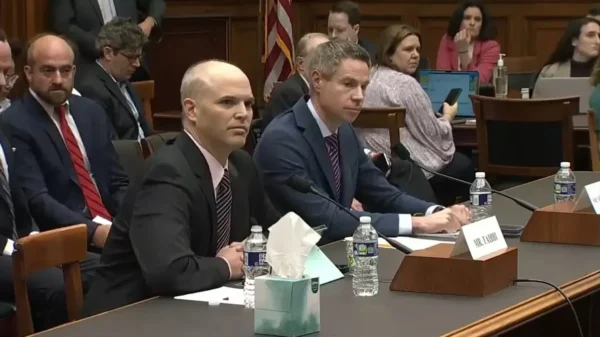Don’t let the man break your brain.
“The Byway is brainwashing the kids,” one reader told me once.
Every now and then we survey our readers to see what they like or don’t like about The Byway, which helps us decide what things we should cover. The feedback is always helpful, even if we disagree with it, because perceptions matter.
Thanks to one of our editors, Abbie, we’ve gotten more feedback lately. One takeaway from recent surveying? Some people in Torrey don’t like us very much. We get it — there’s a lot to not like about this paper.
Months ago, however, there was one response we got that has stood out. The reader stated that he couldn’t support the paper because of — get this — Donald Trump!
He then provided a detailed explanation about why Trump was evil — describing the former president as a liar and an egotistical and power-hungry spy. We get it — there’s a lot to not like about Trump.
But on the other hand, this reader’s conflation of Trump and The Byway was a real head-scratcher.
True, as a news media outlet, we have covered Trump on occasion — usually incidentally, in stories on other topics. Once, in the November 23, 2020, issue one of the kids drew a not-so-flattering picture of a turkey with Trump’s hair. Its caption mused on whether President-elect Joe Biden would “pardon” this particular turkey next Thanksgiving.
That’s kind of funny now, after Trump’s conviction on 34 counts of — something. No pardons here, just prosecution!
Otherwise, we have covered Trump issues rather delicately and sparingly. We have left heavier reporting of Trump to other outlets, such as America’s official fanbase of Trump haters, CNN.
While not a major source for Trump news, I feel most writers of The Byway have, at least accidently, been rather conservative. For this reason, we think that readers’ mental merging of Trump and this paper was not so much about The Byway as it was about conservatives in general. Many liberals have wrongly conflated conservatism with Trumpism.
Deranged
Trump Derangement Syndrome, or TDS, is an informal, pejorative term coined to describe an unreasonable opposition to Donald Trump. Some have defined TDS more broadly to describe anyone who simply doesn’t like him, but that is wrong. My guess is that most Americans don’t actually like him personally — but many of these people believe he was good for the country in his first term, and will even vote for him this November.
TDS is more specific than that: it refers to an unreasonable dislike of Trump that is strong enough to impair other parts of a person’s life. Some may deny the existence of TDS. But admit it: a person’s reasoning can become “deranged” by getting too emotional about anything — not just Trump.

An essential element of TDS is “the horn effect,” (as in, the devil’s horns) which is the evil sister of the halo effect. The horn effect is a cognitive bias that causes a person to unduly dislike a person generally based on a single specific negative trait.
If that seems ambiguous, think of it this way: the horn effect is what governs the relationship people have with their ex.
Both the halo effect and horn effect scrub out the nuance of complex personalities, causing us to see a person as either all good, or all bad.
Under this derangement of reasoning, those suffering from TDS cannot see anything good about Trump. In their minds, everything he does is bad, so they run the other way. It can also cause people to hate anything associated with Trump, such as conservatives — a true example of guilt by association.
In this article, I will only be discussing TDS, and not some people’s unreasonable love of Trump (halo effect “Trumpers”). While that can be just as significant a derangement problem, I feel it has already been discussed at length elsewhere.
Mindless Opposition
I dare say that no one has molded the modern Democratic Party’s platform as much as that arch-Republican, Donald Trump.
How embarrassing.
“Trump Derangement Syndrome is what done did the Democrats in,” wrote John Feehery in a mostly fair opinion piece for The Hill. “On issue after issue,” he wrote, “whatever former President Trump was for, the Democratic leadership and followership took an extreme position in opposition.”

When Trump announced plans to build a wall on the Mexican border, Democrats vehemently opposed it even though they had previously supported the idea. When President Biden took office, he axed Trump’s border policies, only to revert back to it just last month after more than 2.5 million (known) immigrants were released in the U.S. — according to official government statistics.
Responding to COVID was another great example of this mindless opposition. When House Democrats emerged from their first impeachment of Donald Trump in February 2020 they suddenly realized there was a pandemic going on. At first, they shrugged it off, but as soon as Trump announced he would not be wearing a mask, the Democrats embraced mask wearing with religious zeal.
When Trump announced in July 2020 that he wanted schools open, in the heat of the pandemic, Democrats decided they wanted them closed.
“Initially the debate wasn’t so politicized,” wrote Nicholas Kristof for the New York Times. “But after Trump, trying to project normalcy, blustered in July [2020] about schools needing to open, Republicans backed him and too many Democrats instinctively lined up on the other side.”

“Some things are true even though President Trump says them,” Kristof conceded.
Much more important than these, Trump caused the Democrats to forget their own heritage in basic civil liberties, leading for instance, to the mass-incarceration of hundreds of pre-trial January 6 defendants.

Abandoning civil liberties, they also attacked free speech. Even the progressive organization American Civil Liberties Union (ACLU), which was once the leader in defending free speech, abandoned its free speech absolutism in order to fight “progressive causes” during the Trump era.
“Democrats and liberals … no longer believe in free speech,” wrote independent journalist Glenn Greenwald. “That is not hyperbole.” He then pointed to a 2021 Pew Research poll that found 65% of Democrats believe the government should restrict so-called “false information” online. Just 28% of Republicans agreed.
That’s government censorship, folks.

And Dems tell us that Trump is the one who is authoritarian and the real threat to democracy. Maybe that’s true, but do you trust the party trying to silence dissent to save democracy?
Evil Conservatives
Liberals’ hatred for Trump has also spilled over against conservatives. When the January 6 rioters stormed the Capitol in 2021, most conservatives were deeply embarrassed by the behavior of a small group of unhinged angry people. Conservatives knew they’d be unfairly implicated, and of course they were.
Largely liberal themselves, mainstream media has in recent years found themselves in an echo chamber (or silo) where only liberal views are heard. Some of these journalists (mostly in New York City and Washington, DC) don’t seem to know any conservatives.
That has been problematic for them — not only in how they choose to report news events, but also in falling prey to their own echo chamber.
That problem manifested itself in the 2016 election when people in America — which journalists remembered was an area somewhere west of the DC Beltway — elected Donald Trump as president. Who were these mysterious Trump voters? What terrible people!
Liberals’ misunderstanding of conservatives of course is ongoing. They see all conservatives as January 6 rioters, Trump supporters, sexists, and racists. “Is sexism the Republican Party’s big-tent strategy?” asked Adam Serwer, writing for liberal publication The Atlantic last January.
Rebecca Traister, writing for the liberal outlet New York Magazine last month, questioned how women can be Republicans at all, let alone serve as elected leaders. “Women fundamentally cannot lead a party that wants to oppress women; they cannot, in fact, even be fully human within it,” she wrote.
I don’t know, maybe some women choose to be Republicans for some other reason besides oppression?
When some fully-cocooned liberals emerge and actually meet conservatives, they are baffled. One CNN reporter, Michelle Kosinski, tweeted in May that she was still haunted by a dinner she had with conservatives.
“A few weeks ago,” wrote Kosinski, “I had dinner with a few couples, friends of friends, all American. All were well-educated and successful in careers. They seemed great! On the surface. For like an hour. But slowly, over a few drinks, they began to let slip their true MAGA natures …
“As it went on, my friends and I realized we were surrounded by otherwise carefully closeted MAGAts …
“They are out there.
“This dinner continues to haunt me. They all seemed so … normal.”

She then accused her dinner company of only living “in their own warped information silos.” Ok, maybe silos can only be seen from the outside.
Kosinski could have thought instead that, maybe there are a few normal conservatives out there after all. That would have been a reasonable conclusion. But instead, she went the other way in painting conservatives as even more sinister than she thought — “closeted MAGAts” in disguise as normal people!
Now that is derangement indeed. Kosinski was no match for the plate of cognitive dissonance she was served during that haunting dinner.
A Bulwark
The state of affairs for positive, civil discourse between Americans’ ideologies has become quite poor in recent years. Liberals and conservatives both view their opposites with growing suspicion and animosity.
A Pew Research poll conducted in late 2019 asked “daters” (defined as “single and looking”) whether they would enter a relationship with someone in the opposing political party. In the poll, 47% of Republicans said they would not have a relationship with someone who voted for Hillary Clinton. On the other side, a whopping 71% of Democrats said they would not have a relationship with a Trump voter.
Of course, opening a mere dialogue with rivals should be easier than marrying them.
In a polarized society, it’s time to discover our own political principles — what we actually believe — and put them above political policy, and even above the politicians. Don’t let your love for Trump, or your hate of Trump, dictate what you believe. Put principle above party, and above politician.
In May, liberal commentator Bill Maher went on the conservative Gutfeld! show at Fox News. Maher has been openly critical of Trump, but has been careful to not let this dislike tarnish the rest of his beliefs.
“Let’s not pretend that these disagreements are not profound,” he said to Greg Gutfeld’s Trump-loving panel. “Let’s just say, ok, they are profound, but you know what? There’s 90 other things we could talk about which we wouldn’t disagree on, and I can’t hate you, I’ve said it a million times, you could hate Trump, you can’t hate all the people who like him. It’s half the country.”
“I’m certainly not blind to Donald Trump’s faults,” Maher continued. “I get it why people choose to vote for him. Somebody who’s conservative once said to me, ‘what you don’t get, you liberals don’t get about Trump is that we don’t like him either. We just see him as a bulwark against the nonsense on the left.’ And I understand that. Because there is a lot of nonsense on the left.”
There, Maher shared one of his guiding principles that has allowed him to carry a dialogue with those he disagrees with. “We are polarized,” he said. “I don’t think we can deny that. The point is, that we can also be friends.”
– by AJ Martel

AJ Martel – Escalante
AJ Martel is the youth coordinator at The Byway, but he is involved in most everything. He and his family live in Escalante, and they love it here! AJ has found Utah’s small towns quite inviting and under-defended, which is why he’s so involved with the paper. What AJ loves to do most, though, is serve his community. That is clear through everything he writes and does for Escalante, Utah.

